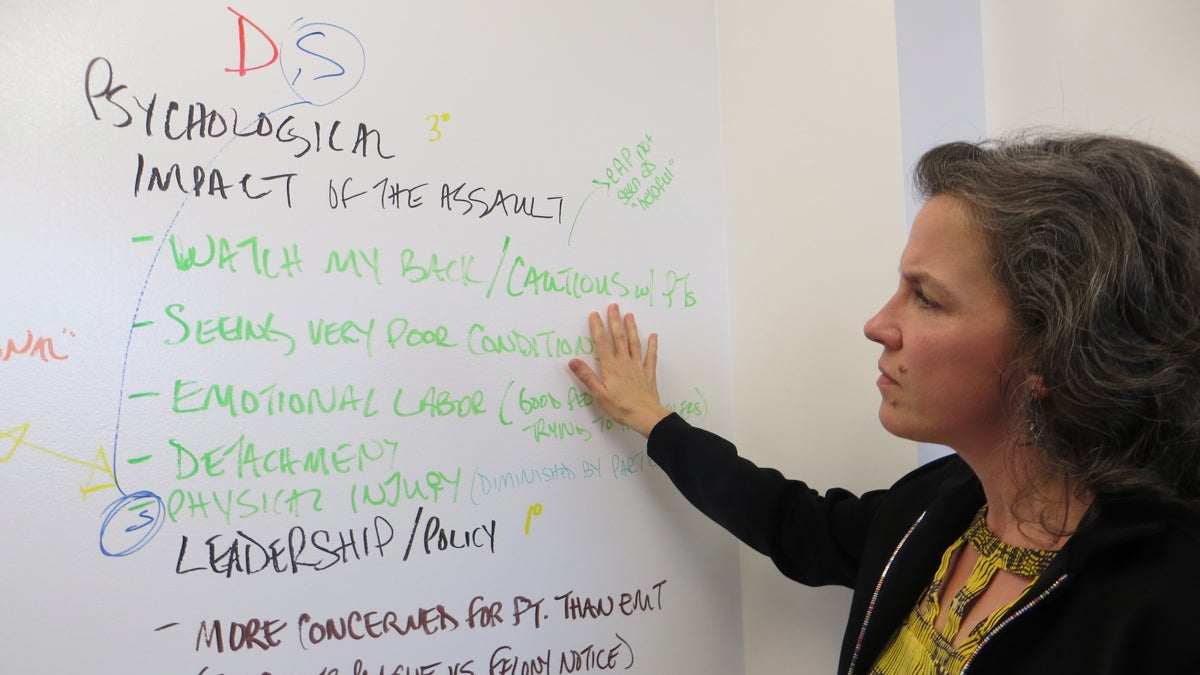Philly first responders attacked by those they seek to help

Jennifer Taylor, a researcher at Drexel University School of Public Health, is studying the impact of work-related assaults on Philadelphia paramedics and emergency medical technicians. (Taunya English/WHYY)
Punched in the eye, head butted, tackled by a drunk person — sometimes that’s part of the job of working as a paramedic in Philadelphia.
Health researchers at Drexel University are gathering information from Philadelphia Fire Department reports to try to understand more thoroughly the injuries that emergency medical technicians and paramedics encounter on the job.
“We’re seeing about six to ten assaults per year that resulted in an injury to a paramedic or firefighter,” said Jennifer Taylor, an associate professor in the Department of Environmental & Occupational Health at Drexel University School of Public Health.
That’s a very small number, compared to the nearly 340,000 emergency calls that paramedics and EMTs respond to in Philadelphia each year. Still, Taylor said she’s worried about the stress that comes with knowing you could be hurt by the people you are trying to help.
The researchers interviewed workers struck in the line of duty by patients, family members or bystanders at the scene of a call.
“I have been kicked, punched, bitten, spit on, verbally abused. You name it, I’ve had it all,” one female paramedic reported to the Drexel team.
The study participants were not identified by name.
A male EMT said: “I definitely don’t take my eyes off a patient at all. Ever since I — I do my best, even if it’s someone I don’t feel was a threat at all. I don’t take my eyes off them. I don’t turn my back on them.”
After those conversations, Taylor said she started to suspect that many unintentional assaults never make it into an official city record.
“They tend to not report those because they don’t want to report that, ‘some old lady hit me in the head’,” Taylor said.
“The person didn’t intend to hurt them, they just were medically out of their mind and they were combative when people were getting close and trying to care for them.”
“From the male perspective, I can see them underreported because of the macho nature of the fire service,” said city Fire Commissioner Derrick Sawyer. “Sometimes they are not reported because they’ve gotten the patient under control so they feel there’s no reason to report the assault.”
Sawyer would like to see better training for workers so they can walk into a home and spot the red flags that could lead to a combative situation.
When the researchers reviewed national data on assaults some common factors included patients under the influence of drugs or alcohol, people with mental health problems and patients suffering a seizure or low-blood sugar.
Sawyer said he wants to know more about the community members who strike emergency workers. He said a good next step would be to interview the people who’ve hit a paramedic or EMT.
Assaulting a first responder is a felony in Pennsylvania, and Sawyer said he pushes for prosecution.
“Sometimes judges may feel as though the assault wasn’t intentional, and they may be a little more lenient. Once it gets to the court system, or the legal system, we have no more control over that,” Sawyer said. “But I can say that getting it to the legal system, we support them 100 percent.”
WHYY is your source for fact-based, in-depth journalism and information. As a nonprofit organization, we rely on financial support from readers like you. Please give today.

